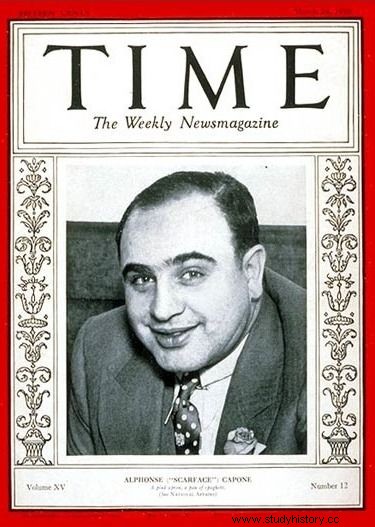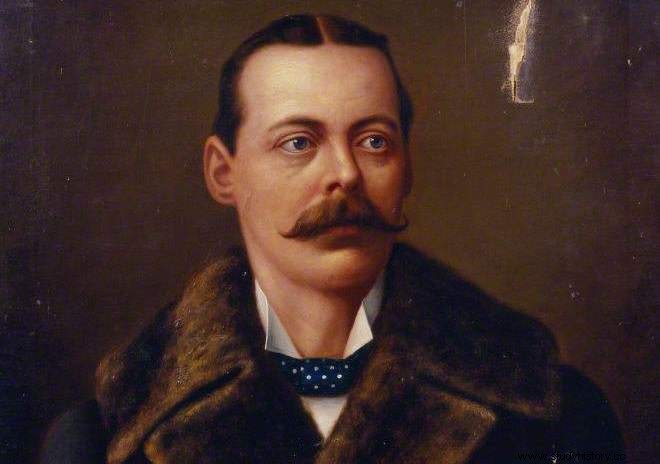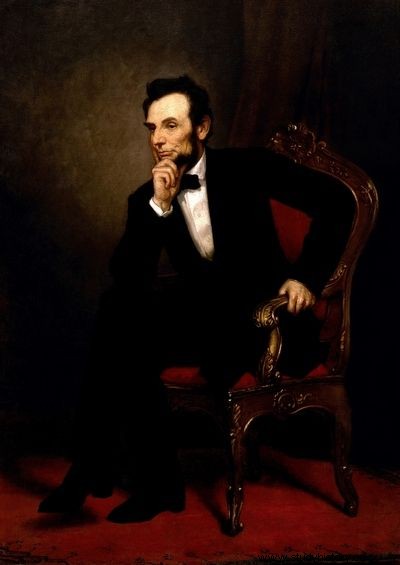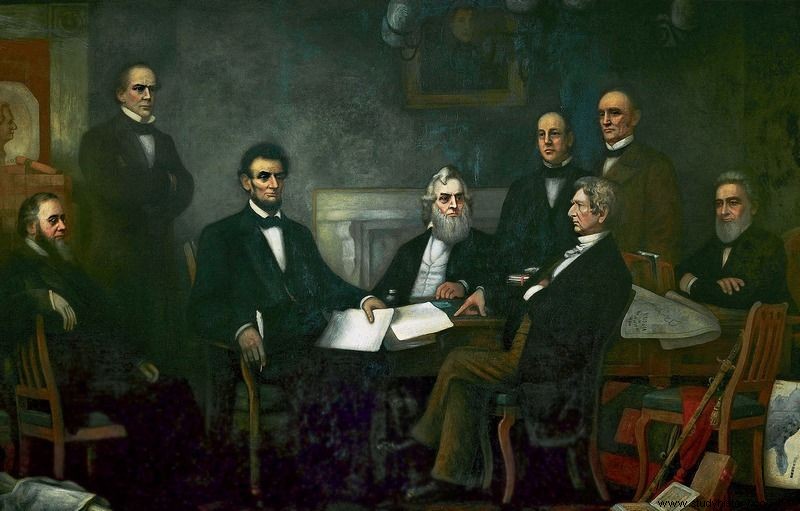Convulsions, nervous palsy, and above all, progressive mental disorders. These are just some of the symptoms of syphilis - one of the most ominous diseases in the history of the world, whose historical role is still underestimated. Al Capone, Randolph Churchill (Winston's father) and Ivan the Terrible suffered from syphilis. It is possible that it was also at the root of Adolf Hitler's madness.
Hundreds of famous historical figures have been suspected of having syphilis. It has been one of the favorite accusations in all kinds of political lampoons since the early modern age. On the other hand, history promoters also like syphilis as a controversial and difficult to refute explanation of the mental disorders that plague rulers, politicians and artists. It was written that Napoleon, Artur Schopenhauer, Franklin Delano Roosevelt, Vladimir Lenin, Fyodor Dostoyevsky, Tolstoy, Joseph Stalin and Woodrow Wilson suffered from syphilis.

The syphilitic was allegedly, inter alia, Vladimir Lenin.
For the most part, these were purely unfounded rumors, but in the case of some of the leading actors in history, such a diagnosis seems extremely probable, or even certain. Based on the new book by Deborah Hayden Fri Pox. Genius, Madness, and the Mysteries of Syphilis "let us recall some of them.
Adolf Hitler (1889-1945)
The Führer of the Thousand-Year Reich a syphilitic? This is a tempting thesis, although in this one case we can only speculate. One thing has to be admitted - if Hitler did suffer from syphilis, it would be easier to understand his insane dreams of taking over the world and exterminating all "subhumans".
The information that Hitler was struggling with syphilis years later was published in his memoirs by his friend from the times of the Nazi meetings in beer halls and the Munich coup, Putzi Hanfstaengl. According to this renegade Nazi, the future leader of Germany contracted syphilis as early as 1908 in Vienna . Significantly, this is not the story that a former NSDAP sponsor wrote after he abandoned Hitler to purify himself by criticizing him. Szymon Wiesenthal, a well-known tracker of German criminals, managed to establish that Hanfstaengl was talking about the disease of the Reich leader while he was still enjoying the favors of the regime.

Hitler in 1914 (seated first from right) - shortly after he allegedly contracted syphilis from a Viennese prostitute (source:Bundesarchiv; lic. CC ASA 3.0).
Anyway, the rumor of Hitler's syphilis was widely repeated in salons and on the streets - usually adding that he had contracted the infection from a Jewish prostitute. Of course, rumors are no historical evidence. However, we have stronger premises. First, in 1936 Hitler hired none other than a reputable syphilologist as his private physician , Theo Morella. This aroused consternation in the commander's immediate surroundings, especially as he praised the salutary effects of the therapy administered by Morell.
Second, a respected London specialist in the same field, T. Answyn, reached out to two male syphilitics who claimed to have been infected by the same prostitute as Hitler. The fact that the Fuhrer in recent years in power suffered from the third, most advanced stage of syphilis was believed not only by Answyn, but also by the aforementioned Szymon Wiesenthal, who saw in this ailment the basis of the madness embracing the German leader. Also Putzi Hanfstaengl in his work "Hitler:The Missing Years" published in 1957, inter alia, with the developing syphilis, explained the transformation of an eloquent, folk orator into a diabolical monster hungry for unlimited power.
Surprisingly, this thread of his research was completely ignored by later researchers and readers - instead of mentioning kile, in subsequent books, Hanfstengel's ideas about Hitler's addiction to masturbation, his undefined sexual orientation and impotence were cited rather. By the way, Hitler himself was truly obsessed with syphilis - in "Mein Kampf" he devoted several pages to this degenerating Jewish disease (his words, not mine).

Was syphilis at the root of Adolf Hitler's madness?
All that has already been written, however, is still only speculation. The fact that Hitler may have suffered from syphilis is indicated above all by the ailments he complained of. They are in line with the list of symptoms of syphilis.

The fact that Hitler suffered from syphilis was convinced, among others, by Szymon Wiesenthal (source:National Archives of the Netherlands; photo:Rob Bogaerts; license CC ASA 3.0).
Hitler suffered from acute abdominal pain, intestinal cramps, recurrent headaches, numbness in the limbs and shaking hands, insomnia, dizziness, and gradual deterioration of memory. Moreover, he had serious heart problems - besides madness and paralysis, one of the three main determinants of the last stage of syphilis. According to Deborah Hayden:
the logs provide an abundance of indications that Morrel discovered with his stethoscope the first signs (...) of syphilitic heart disease.
Was Hitler really suffering from it, or did he just have similar symptoms of another disease? We may never know it, but the mere suspicion that it was so sheds new light on the biography of the leader of the Third Reich, World War II and the Holocaust.
This article has more than one page. Please select another one below to continue reading.Attention! You are not on the first page of the article. If you want to read from the beginning click here.
Al Capone (1889-1947)
How did Al Capone - the most famous gangster in American history - evoke the strength, ruthlessness and determination needed to lead the mafia? According to his biographer Laurence Bergreen, the answer is very simple:it is all thanks to syphilis!

Al Capone. A gangster made by syphilis? (Cover of "Time" from 1931)
Young Al was an introverted, quiet and not very go-getting boy. Meanwhile, the Capone we remember is the work of a disease that stimulated his personality (p. 314). The syphilis' symptom swings turned into murderous outbursts of anger, and the unbroken mind allowed the gangster to gamble and play with life - both other people's and his own - without hesitation.
Only in prison, as inmate number 40886, Capone was referred to unsuccessful therapy against syphilis. The disease continued to develop, and after he left prison, the former king of the underworld was sent incognito to the renowned Johns Hopkins Hospital. According to surviving sources, was a quiet patient who generally seemed normal, at least until he began to delude (...) and believe that he owned a factory with 25,000 workers (p. 315).
Randolph Churchill (1849-1895)
History remembered Winston Churchill's father, Lord Randolph, as a staunch statesman and politician of merit for the country. Meanwhile, in his youth, he led a colorful life, not only about the affairs of the state. Even during the Lord's lifetime, who had been in parliament for twenty years, almost everyone in London knew he was suffering from syphilis. Besides, the disease was difficult to hide, because the prematurely aged politician still participated in the meetings of the House of Commons.

Randolph Churchill. Not in all respects Winston Churchill could be proud of his father…
Once a go-getter and ruthless, as well as tactful and feeling in politics like a fish in the water, in recent years Randolph Churchill aroused only pity. During one of the sessions of parliament
stood up (...) with trembling hands, speaking in such a twisted manner that from the very first sentence nothing could be understood, and members of the House of Commons fled into the hall (... ). There was a terrible, maddened look on Randolph's face (p. 311).
According to Professor of the Medical College of Georgia Robert B. Greenblatt, Churchill suffered from difficulty concentrating, headaches, mood swings, extreme nervousness, speech and writing problems, impotence, and progressive dementia. He died at just 46 years old.
His friend Frank Harris described how Randolph allegedly contracted syphilis. If we take into account that we are talking about a British lord, the story seems to be at least unusual:
After a night of drunkenness, Randolph woke up in a strange room with a hideous aftertaste in his mouth. He saw a tuft of dirty gray hair on the pillow next to it. To his horror, he discovered that his companion last night was an old woman with only one yellow tooth (...), calling him "Sweetheart". Hysterical, he threw all the money he had with him on the bed and ran out (p. 311) .
Anyway, his fear was justified. Reportedly, after three weeks, he saw the first symptoms of syphilis and began taking a lethal mercury treatment.
This article has more than one page. Please select another one below to continue reading.Attention! You are not on the first page of the article. If you want to read from the beginning click here.
Abraham Lincoln (1809-1865)

Abraham Lincoln. Another syphilitic in power?
There is no doubt that the Americans have a real crap about their 16th president. He still wins the polls for the most popular US leader in history, and many treat him as an impeccable icon or even a saint among politicians. No wonder that with such a vision of Lincoln, the Americans made sure that mentions of his syphilis problems disappeared under a pile of praise biographies.
Meanwhile, it was Lincoln himself who would confide his embarrassing illness to his friend and later biographer, William Herndon. Apparently, the future president contracted syphilis when, while in the town of Beardstown, Illinois, , overcome with devilish passion, he reunited with a girl and caught the disease from her. ( …) Lincoln told me about it himself in a moment of madness (p. 126). According to Herndon, it did not end there, because a year later 27-year-old Abraham got involved with a certain Joshua Speed and this time the disease took him over for good. Let us add that the future wife of Lincoln, Mary Todd, also likely suffered from syphilis, although it is impossible to say who infected whom:she infected him or her.
While most historians have downplayed the evidence that the Civil War president suffered from syphilis, the symptoms are all correct. In addition, Lincoln was taking mercury pills that were used to "treat" syphilis at the time - today we know that they only aggravated the symptoms and hastened death.

Abraham Lincoln with members of his cabinet in 1864. There are many indications that he was already falling into syphilis-induced madness.
Lincoln has increasingly experienced attacks of anger, mood swings, sleep problems and headaches in the last years of his life. Besides, he was finding it more and more difficult to sign documents. Herndon observed that he sometimes spoke to himself crazy and incomprehensible nonsense (p. 130). The president himself openly feared imminent death and falling into madness. One can only speculate how his illness and ability to exercise power would have developed had he not died in the 1865 assassination attempt.
Ivan IV the Terrible (1530-1584)

Earlier history also knows many syphilitics, although the further we go back into the past, the more difficult it is to separate facts from myths and rumors. According to Deborah Hayden, for example, the famous Moscow despot Ivan the Terrible suffered from syphilis. It would be difficult to diagnose him today, although the creator of the first security service in history ( oprichnina ) and the murderer of his own wife, who prided himself on the deflowering of a thousand virgins like a glove, fits the image of a mad syphilitic lord.
If he did suffer from syphilis, he probably contracted it at the age of twenty-three (sources mention that he was seriously ill then), later treating himself for a long time with mercury from the steaming cauldron he kept in his chamber. If so, he lived to be surprisingly advanced age 54 for this condition.
Writing about the famous carriers of syphilis, one cannot forget about Krzysztof Columbus, who, guided by mad, syphilitic delusions, wanted to set off in search of a paradise on earth (allegedly located in South America). Many historians even call him the first syphilitic in history. However, this is a topic for a separate article.
Source:
Deborah Hayden, Pox. Genius, Madness, and the Mysteries of Syphilis Basic Books 2004.
